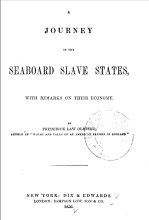Under this "Organization of Labor," most of the slaves work rapidly and well. In nearly all ordinary work, custom has settled the extent of the task, and it is difficult to increase it. The driver who marks it out, has to remain on the ground until it is finished, and has no interest in over-measuring it; and if it should be systematically increased very much, there is danger of a general stampede to the "swamp"––a danger the slave can always hold before his master's cupidity. In fact, it is looked upon in this region as a proscriptive right of the negroes to have this inticement to diligence offered them; and the man who denied it, or who attempted to lessen it, would, it is said, suffer in his reputation, as well as experience much annoyance from the obstinate "rascality" of his negroes. Notwithstanding this, I have heard a man assert, boastingly, that he made his negroes habitually perform double the customary tasks. Thus we get a glimpse again of the black side. If he is allowed the power to do this, what may not a man do?
Frederick Law Olmsted, A Journey in the Seaboard Slave States, with remarks on their Economy (New York: Dix & Edwards, 1856), 435-436, [Google Books]

